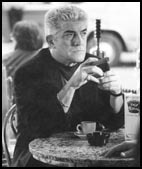
The North End: Thumbs Up or Thumbs Down?
Written by Michele Meek | Posted by: Anonymous
The lead character, Freddie, arrives in the North End as a paisano from Harvard. In this way, Freddie becomes a symbol of the hybrid neighborhood, and through him, we see the conflict between sticking to or breaking from the local culture (and all the cover-ups and dysfunctionality that goes with them).
Ironically, Freddie has arrived in the North End to create a documentary about the changing neighborhood, and the interviews that Freddie acquires from residents exaggerate the contrast between the two stereotypes enough to expose them as just that – stereotypes. For example, the residents respond quite differently when Freddie poses the question "What would you do if you discovered your partner was cheating?" One Italian resident frankly states he’d kill him, then kill her; while one of the yuppies offers the solution of marriage counseling.
This diametrically opposed morality becomes the most fascinating aspect of the film. And I must admit that it was during the interspersed scenes of this mockumentary that I found the most humorous and fresh approach to the subject matter. Not surprisingly, I found myself at the end of the film wishing I could watch Freddie’s documentary.
Who Cares?
by Kiersten Conner
The North End opens promisingly, with perennial mob-movie actor Frank Vincent playing a perennial mob-movie actor in a scene from a cheesy mob movie. It turns out, however, that this is a movie-within-a-movie, or should I say, a movie-within-a-film, and for the following 90 minutes we see only flashes of the opening wit and energy. The North End’s main drawback is that everyone involved seems to have thought they were making a film, instead of what it actually is: a workmanlike first effort from a pair of local Boston filmmakers.
Brothers Frank and Joseph Ciota shot the film in on location in Boston’s North End. Joseph wrote, and Frank directed. Unfortunately, it doesn’t seem that they grasped the most powerful elements of their story. A funny, sad, evocative portrait of a neighborhood and way of life in decline gets lost amidst the sturm and drang of a love triangle anchored by a character we can’t stand. Moreover, the movie’s ending doesn’t ring true with its central metaphor: the neighborhood’s changing, but its culture remains the same.
The story revolves around two recent Harvard grads who take a small apartment in the North End. Mac McCain (Mark Hartman) and Freddie Fabucci (Matthew Del Negro) are best friends, though we never know why: Mac is a brutal, boorish former football star turned investment banker, while Freddie is both a sensitive documentary filmmaker for PBS and the prodigal Italian son seemingly returned to his people. The grainy interviews with the locals that Freddie shoots are interspersed with the film’s action, in which Mac falls for local beauty Dani (Lina Sivio) and clashes with the ways of the neighborhood. Freddie, quickly rechristened "Freddo", fits right in and tries to smooth the way.
Therein lies the problem: You can’t use the name "Freddo" in a movie with mafia overtones without it referring to The Godfather. While the reference is explicit in The North End, it doesn’t mean anything about the character or his fate. It’s just there. This amateurish quality pervades the film. When we first meet Dani, she serves drinks to Mac and Freddo. While Mac salivates over her, Vincent’s character explains that women from the North End need to be "sipped," carefully. Ciota immediately cuts to a tight shot of Mac glug-glug-glugging down his drink. When Mac asks Dani whether he’ll see her again, she replies, "Of course. This is the North End." It’s hard to take the ensuing "tragedy" seriously.
While Hartman, Del Negro, and Sivio get most of the screen time, Frank Vincent is the best thing about the movie. Unfortunately, he’s too much on the periphery; he and his North End cronies comment on the action but don’t influence it. Vincent’s role as a North End type gone Hollywood is a wonderful snapshot of the way his lamented neighborhood is being destroyed: the picturesque becomes valuable and the yuppies move in. Those evil up-and-comers probably wouldn’t have come, however, if Vincent’s own movies hadn’t glamorized the area. Any remaining authenticity is lost.
The film skirts around what feels like a major theme: was this a way of life worth keeping? The point is made more than once that women feel safe in the North End because they are beaten only by their loved ones. Mac doesn’t seem so far removed from them, and while Dani’s elders notice that Mac is smacking her around, they don’t do much about it. Similarly, Dani talks about wanting to leave the neighborhood, but claims she can’t because of ties to friends and family. The North End isn’t wartime Casablanca; the viewer is left wondering why she can’t take the subway like everyone else. Consequently, the ending feels empty: Mac’s a monster, Dani’s a bubblehead, and Freddo’s so passive he practically blends into the walls. Why should we care about their tragic fate?
The North End will show at the Avon Theatre in Providence, RI on on Sunday, March 15.









